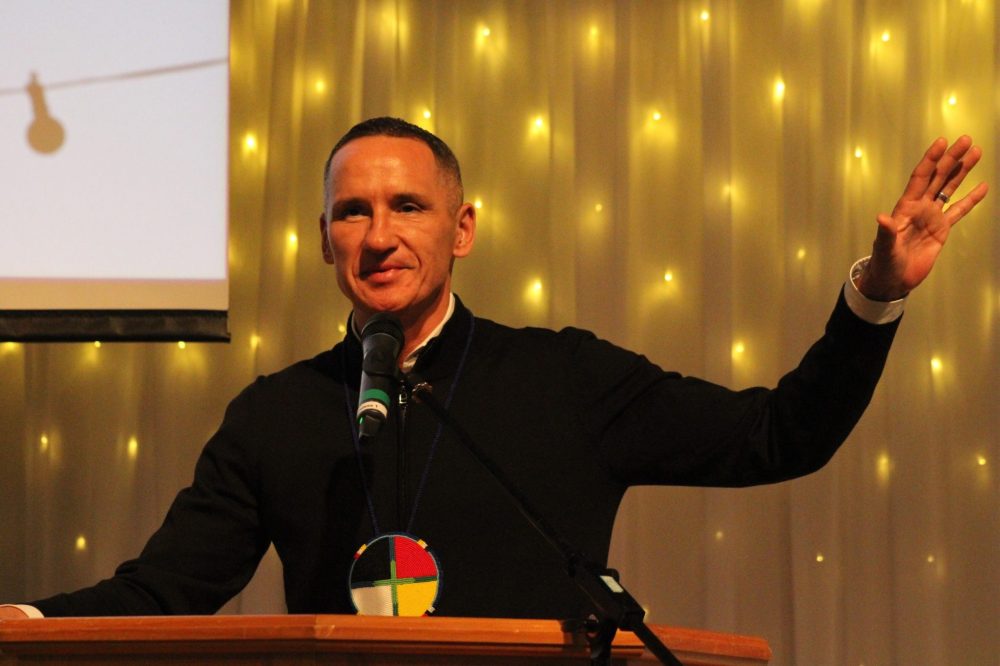Chief shares inspiration at gala event
Advertisement
Hey there, time traveller!
This article was published 05/06/2024 (328 days ago), so information in it may no longer be current.
Known for his jigging skill and his time as an MLA, Kevin Chief took guests at the MHV Spring Gala on a 40-minute journey on May 24.
Chief shared stories of those who inspired him, what he sees as important on the continued journey of reconciliation and challenged the audience to practice life with grace and remain open to learning.
Chief represented Point Douglas in the Manitoba legislature from 2011 to 2017 as an NDP member but is also known for his work with the Norman Chief Memorial Dancers, a group named after his late father.

Born and raised in Winnipeg’s north end, Chief was raised by a single father in what is one of the poorest postal codes in the nation.
Chief spoke of his admiration and friendship for and with Steinbach MLA Kelvin Goertzen and former Steinbach Mayor Chris Goertzen. “You are incredibly represented well in the legislature,” he said.
He also took the time to recognize those who made an impact on his life, including his Grade 4 teacher Mrs. Wilson.
The son of an alcoholic residential school survivor, Chief had challenges growing up.
“Although my dad never came to a parent teacher interview, and although I struggled, I wasn’t unique in Mrs. Wilson’s class,” he said. “But when she looked through my eyes, she didn’t see hardship. Somehow, she saw potential, and she reminded me every day that anything was possible as long as I worked hard.”
“The one value that she used in her class was the value of encouragement,” he added.
Chief said showing up, working hard and being humble are the secrets to success.
He said after missing school for a few days he’d show up, ashamed that he hadn’t been there. She would simply welcome him back, putting her hand on his shoulder. “She’d say ‘I’m so happy to see you but you missed some school. Are you ready to learn today?’”
“She’d find a way to tell me those hard things even though she knew I was struggling because she couldn’t lower the bar,” he added. “She knew she had to find a way to connect with the students in her classroom.”
He said people everywhere are seeking belonging and are even willing to deny who they are culturally simply to feel like they belong.
“My last name is Chief and there was a time in my life when I wasn’t proud of that name,” he said. “It reminded me that I was low income, that I had an alcoholic father.”
He recalls being asked if he was native or an “Indian”.
“I never wanted to say yes to that because I thought if I said yes that meant I didn’t belong.”
That yearning for belonging also came out of the six-year Truth and Reconciliation Commission headed up by Justice Murray Sinclair as he heard from 7,000 residential school survivors.
“That part of Canadian history we were telling Indigenous children that everything about who they were and where they came from didn’t belong here,” he said. “Their spirituality, their language, the colour of their skin, they didn’t even belong with their own families.”
He said when questioned on why the 94 calls to action would be heard and acted upon when more than a thousand recommendations from Indigenous leadership to government had previously been ignored, Sinclair pointed out that they were directed at fellow Canadians, not just government.
He said signs that Canadians want to understand and want to do the right thing can be found in the fact that he, an Indigenous former NDP politician, was in Steinbach at all.
“You don’t invite Kevin Chief on a Friday evening to an event like this with my background, who I am or where I’m from if you don’t have open hearts and open minds,” he said. “I don’t get to podiums like this. It’s a testament, not to what I’m saying, but to your history, to the values that you live.”
Chief said it’s important that Canadians learn their history, including their roots and those of the Indigenous people.
“You can’t remove the history of the Mennonite people, but you also can’t remove the unique relationship this province and country also has with First Nation, Metis and Inuit people,” he said. “It’s not Mennonite history or Indigenous history. It’s our collective history.”
Chief said he wants a world where every child has equal opportunity to say they are proud of who they are and where they’re from.
He also shared a story of a homeless uncle and said he realizes that many behaviours including the alcoholism that ended his father’s life, were coping mechanisms.
Chief said even if someone did believe the stories of abuse, in those days there was nothing they could do.
“You don’t pass those burdens down to your children. You carry them,” he said. “So, when you carry hurt and pain and shame they multiply, and they grow. And when my dad got to a certain age, he realized that alcohol could help deal with that pain.”
His call to guests gathered at the gala was to ensure they stop themselves from judging, and instead be willing to learn and show grace.
“Maybe that’s what I’m asking from all of you,” he said. “Maybe if we can find it in our hearts to bestow grace on others, maybe it finds its way back to us.”
“There is a universal truth whatever god you believe in, whatever creator you pray to, whatever values you live by,” he added. “A life lived in service to others is a life well lived.”
